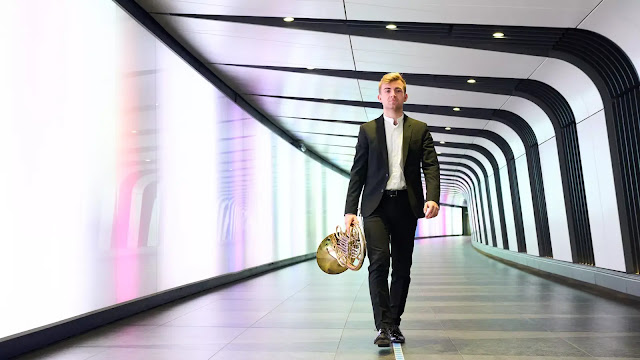 |
| Ben Goldscheider |
Horn player Ben Goldscheider has talked in interviews about his desire to expand the instrument’s repertoire, and he has certainly been busy doing just that. So far this year he has premiered Gavin Higgin’s Horn Concerto [see my review] as well as that by Huw Watkins [see my review], both works providing significan technical challenges, plus giving a recital at Wigmore Hall featuring contemporary works by Watkins and Jörg Widmann [see my review]. But Goldscheider is also keen to challenge perceptions of the instrument, presenting it in a wider range of settings as well as promoting it as a solo instrument.
To that end, he has commissioned three new pieces for horn and live electronics, as he explains ‘I am personally fascinated by the speed of the technology and how, in surround sound, the eyes and the ears begin to deceive one another as the live horn playing intertwines with the electronics. This programme aims to stimulate, to broaden perspectives and allow a glimpse into relatively unknown territory with the instrument that Robert Schumann calls “the soul of the orchestra”.’
On 27 June, Goldscheider will be at Southbank Centre’s Queen Elizabeth Hall with Philip Dawson for a programme of horn and live electronics including premieres by Zoë Martlew, Dame Thea Musgrave (who recently celebrated her 96th birthday) and Mark Simpson, all commissioned by Ben Goldscheider, plus recent works by Alex Groves and Hildegard Westerkamp.
Zoë Martlew’s Nibiru is inspired by the prophecies of cataclysm from the encounter between the Earth and a large planetary object, supposed to take place in the early 21st century. Martlew describes her piece as opening with nuclear armageddon and ending with a vision of a new Eden, represented by ‘the last known recording of a male Kauai O’o bird in Hawaii, calling for a mate that never came…’
Mark Simpson’s Darkness Moves II takes its inspiration from the work and ideas of Belgian-born poet and artist Henri Michaux (1899-1984) whose experiments with the drug mescaline led him to ‘inner vision that poured through his mind like weirdly agitated and vibrating film’. Simpson’s Darkness Moves from 2016 featured a recording which was manipulated in real time, whereas he describes the new piece as a duet between horn and live electronics.
Thea Musgrave’s Golden ECHO III has a similar trajectory to Simpson’s piece in that Musgrave wrote the original in 1986 for the International Horn Society when a solo horn player was accompanied by sixteen of his colleagues, this was developed into a more portable piece for solo horn and tape. Now for Golden ECHO III, Goldscheider has recorded the original sixteen-horn version, overdubbing the parts himself. Musgrave describes how ‘to enhance the apparent concerto-like virtuosity and freedom of the soloist’ the solo part is not written in strict rhythmic notation.
Alex Groves describes Single Form (Dawn) as a ‘slow motion sunrise of a piece’ that ‘maps out the entire range of the horn’s natural harmonic series, turning dark and murky depths into a shimmering wall of sound ablaze with colour.’
Hildegard Westerkamp’s Fantasie for Horns II began as a piece for tape which received honourable mention at the 1979 International Competition of Electroacoustic Music in Bourges, France. Then, Westerkamp explains, ‘After the completion of the soundtrack, it seemed natural to add a live horn part. Besides being environmental in its choice of sounds, the soundtrack could now become the acoustic environment for the horn – an instrument which, in turn, has had a long history as a sound signal in many parts of the world.’ The sources of the original soundtrack being Canadian train horns, foghorns, boat horns, car horns and alp horns.
Full details from the Southbank Centre website.








